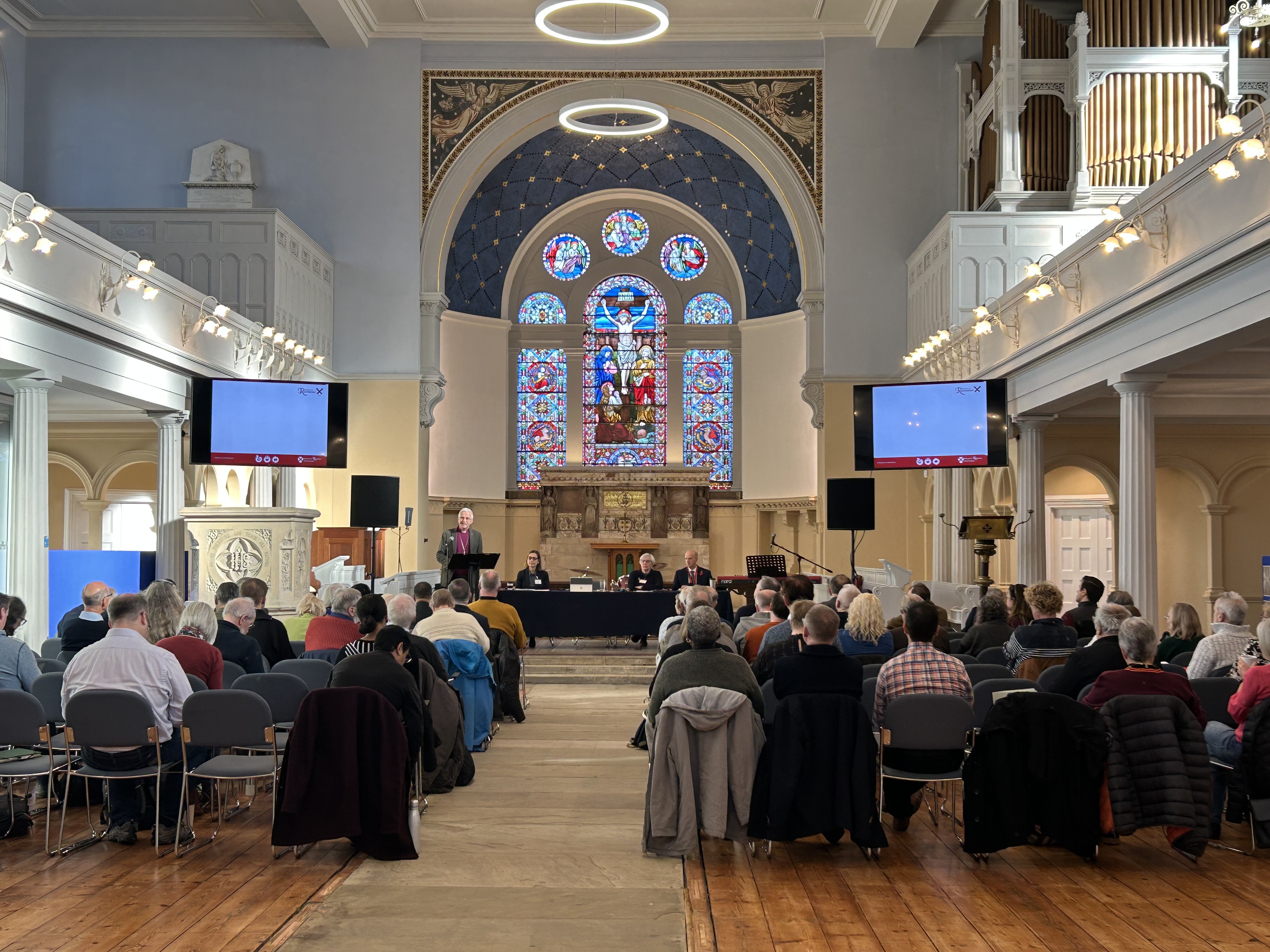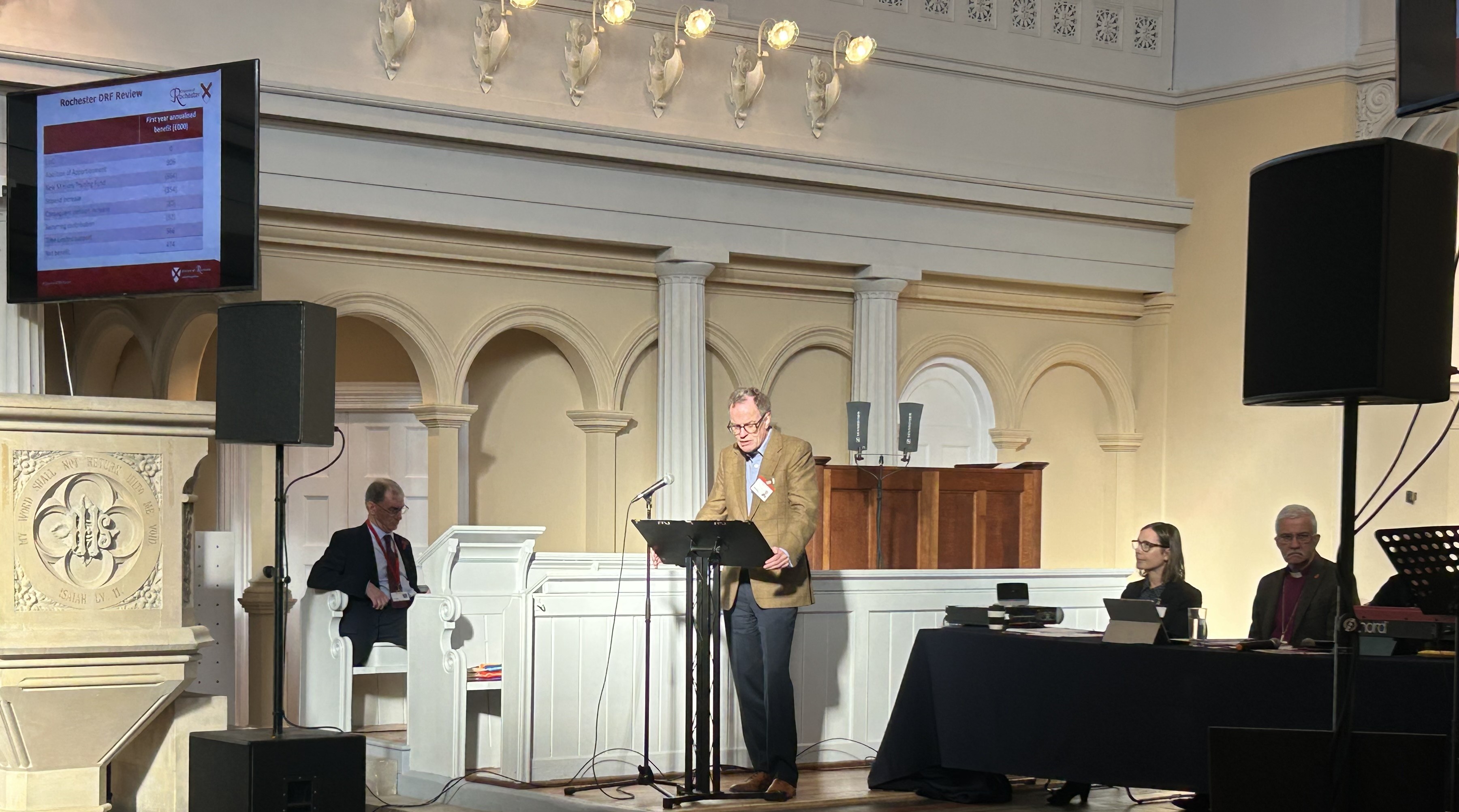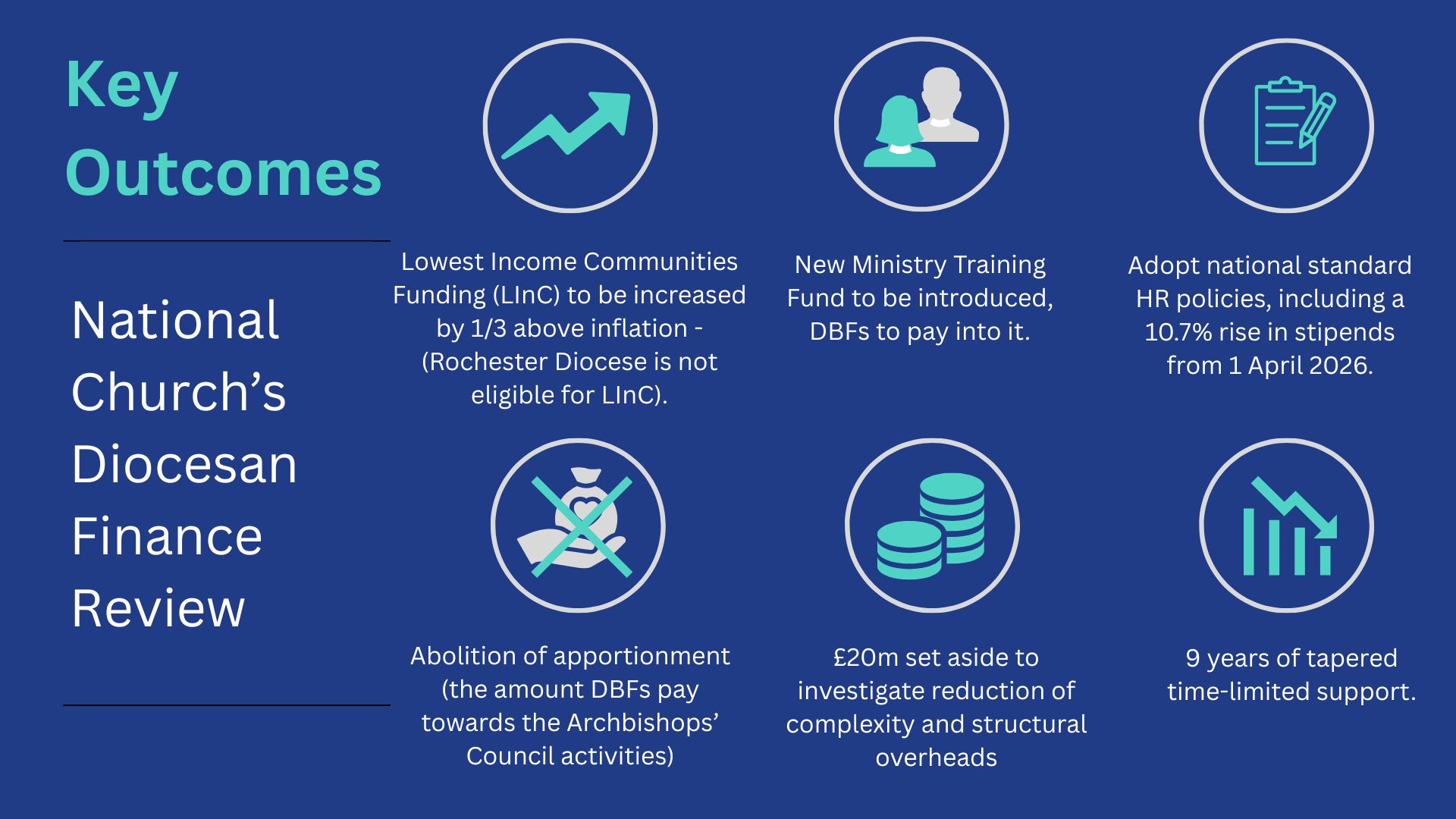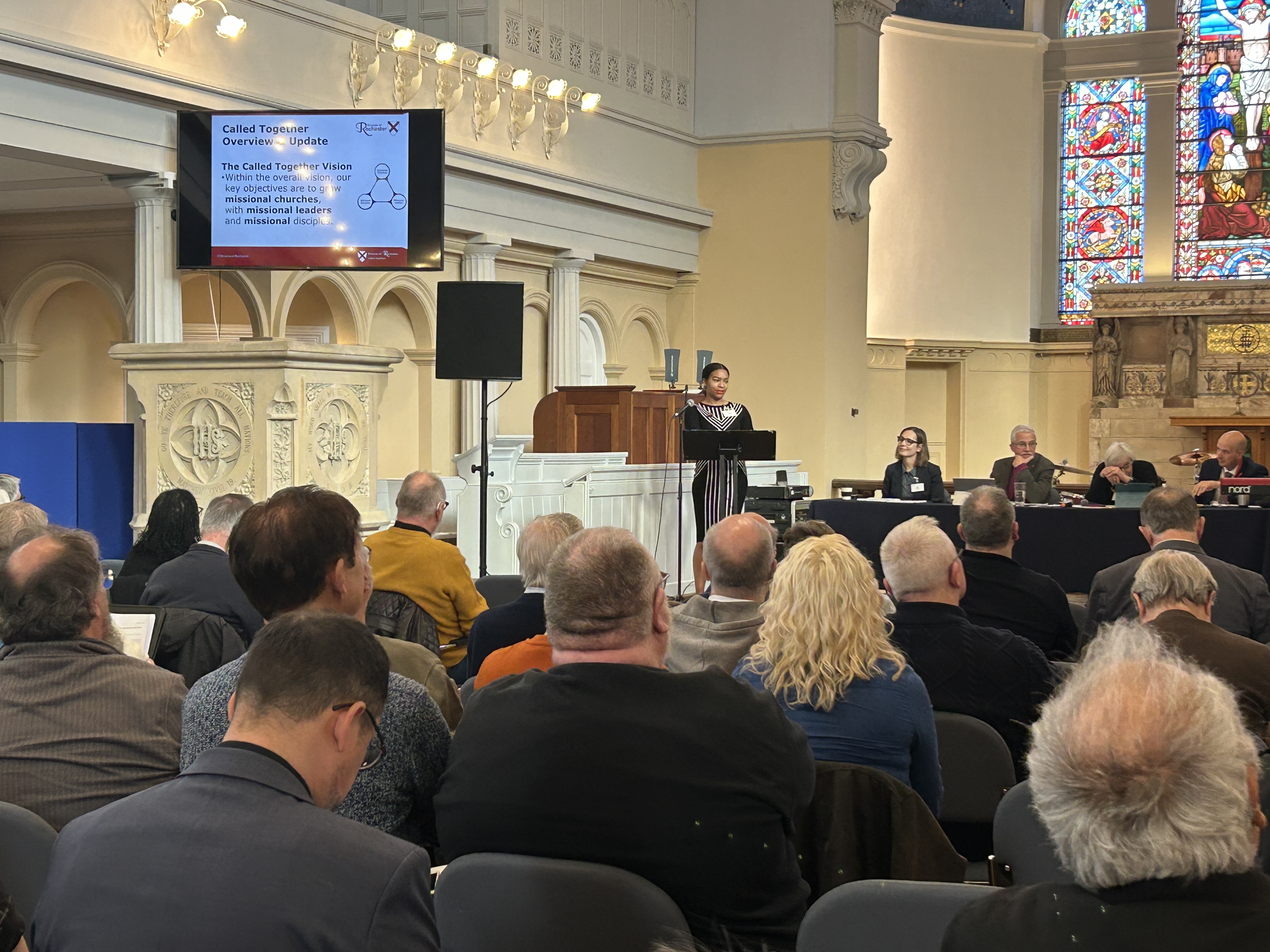
Photo: the recently reopened St John's Chatham hosted Diocese Synod in November
Diocesan Synod met on 8 November at the recently reopened St John’s Chatham.
Items on the agenda included updates on:
- The ongoing programme of work around the Called Together vision
- A presentation on the 2026 Diocesan Board of Finance budget
- Net Zero and the environment
In his Presidential Address, Bishop Jonathan reflected on the question, 'What are bishops for?' as he reflected on some of challenges and opportunities facing the Church.
Read Bishop Jonathan's address
A new chapter for St John’s Chatham
Synod began with a presentation from the team at St John’s Chatham, with an explanation that the congregation had returned in September to their 200-year-old building for worship for the first time in two years.
The return follows an extensive programme of capital building and restoration work that has been made possible thanks to support and partnership with the Diocese of Rochester, alongside funding from the National Church, Medway Council, The Heritage Fund, National Government, Rochester Bridge Trust, , The Friends of Kent Churches, The Benefact Trust, The National Churches Trust, and The Dorothy Kerin Trust.
‘Loving Jesus and loving Chatham’, is at the heart of the church’s vision, and the Rev Canon Martyn Saunders, Bishop’s Mission Order Leader, thanked Diocesan Synod members for their support and for trusting people like the Diocesan Secretary, the Finance Committee, and many others, for bringing the project into being.
The result was this stunning building and the start of a new chapter in the history of St John’s Chatham
The Rev Luke Bacon, Bishop’s Mission Order Associate Leader, explained that the aim going forward is for the doors to be open, to welcome people, to be part of the good news of the locality, to serve the people of Chatham in a way that was sustainable and trusted, and to inspire the community through the way they lived and loved one another at a church.
He re-emphasised that it was only thanks to their being part of the wider diocesan family that any of this had been possible, for which they were hugely grateful.
Read more about the new chapter at St John’s Chatham in Together magazine
Diocesan Board of Finance Budget 2026
Stephen Smith, Chair of the Diocesan Board of Finance, began by encouraging Synod members to read the 2024 Report and Accounts, as they present a fascinating and comprehensive insight into the life and work of the churches in the Diocese, and showed how they were supported by the staff in the Diocesan Office.
He went on to say that the budget before the Synod supported the Diocese’s strategic direction through the Called Together vision. It was unashamedly a budget which believed that growth was possible and that decline was not inevitable. It recognised the challenges to be faced but committed resources where they would make a difference.

Photo: Stephen Smith the Chair of the Diocesan Board of Finance
Stephen also reflected on the impact of the National Church’s recent Diocesan Finance Review which, while in the short-term does provide some relief, does not offer a long-term solution to creating financial sustainability. This is due to the tapered funding on offer which reduces very rapidly over three years, and some additional costs being placed on Diocesan Boards of Finance.
Read more about the national Diocesan Finance Review in the October edition of Rochester Diocese’s Money Matters
John Jackson, Director of Finance, continued the presentation by highlighting that, in 2025, Parish Offers had seen an increase of 2.5 per cent. This represented the first increase in many years, and he expressed the whole team’s sincere gratitude to parishes for their sacrificial giving.
It was imperative however that this growth went on into 2026 and beyond.
John went on to give some context as to the Diocese’s current financial position, by reminding Synod members that, in 2019 the Diocese had almost achieved a break-even position. Then, however, the Covid pandemic hit and, from a deficit of £300k in 2019, a deficit of £1.6m was recorded in 2021 at the peak of the Covid impact.
Much work was undertaken to reduce the deficit in 2022, 2023 and 2024, but in 2022 it was again badly affected by the cost-of-living crisis, which saw costs increase rapidly whilst income from parishes continued to fall. John explained that, if costs had not been tightly controlled, by now the deficit could have been well in excess of £2m, based on wage inflation alone.
Despite this challenging context, John made clear that this Diocese was not interested in measures to reduce ministry, as this was a false economy. Rather, it is seeking to invest in parish ministry.
This is evident in measures found in the 2026 budget such as:
- A 10 per cent increase in stipend to deal with the long-term decline in the value of the stipend
- Funding of 8 new stipendiary curates to invest in future ministry and reduce the clergy vacancy rate in future years.
- £250,000 additional spend on maintaining clergy houses to improve clergy wellbeing.
Altogether, this budget represents an investment of around £1million in parish ministry.
John explained that the proposed 2026 budget, alongside the Called Together vision, represents a strategy for growth but it needed to be a partnership, as the Diocese could not be grown spiritually, numerically and financially unless parishes and the Diocesan Board of Finance worked together.
The tapered time limited DFR funding, he said, would be used to smooth the impact of stipend increases, and other reserves will fund additional investment in parsonages, such that the budget only assumes a 5.3 per cent increase in parish offers in the context of current inflation of nearly 4 per cent.

Image: An overview of the recommedendations of the National Church's Diocesan Finance Review
Additionally, conversations will continue with parishes where there appears to be scope for greater generosity, which has proven successful this year. Together this will enable both the additional £1million investment in parish ministry and a reduction in the Common Fund deficit.
John acknowledged that many parishes were giving sacrificially to the DBF, with some parishes genuinely in a difficult place, struggling to pay even a modest Parish Offer.
Indeed, in 2024, 52 percent of parishes had made an offer which did not cover their basic Cost of Ministry, let alone Diocesan Support Costs or Wider Diocesan Mission. Parish Offers through the Common Fund held in common sustains ministry in those parishes.
None of this was taken for granted and he expressed genuine gratitude to all parishes for their generosity.
There being no questions the following motion was carried unanimously: “That the Synod authorises the expenditure of a sum for the Common Fund not exceeding £14.545m”.
Progress on Called Together vision and strategy
Tia Ndu, who joined the Diocese as the new Head of Programmes in June, began her update by reminding Synod of the overall objectives of the Called Together vision, and how it is seeking to serve all people and parishes, whatever their ministry context.
Read more about the Vision
Outcomes will be measured quarterly or annually, with the first main review likely to be available by next autumn following a full year of work around the vision. Tia said that, as work got underway, the expectation is to share more of the tangible impact on the ground in parishes.

Tia explained that award conditions with the National Church were only met in the second half of September, which had caused a delay in more information being shared following the initial announcement in March that nearly £11million of national funding was to be received.
Read the first quarterly update that was shared in October
Tia then went on to provide information in answer to a question asked at the July Diocesan Synod for more detail about which projects had previously received national funding and their impact.
These were five parish projects (Anerley, Erith, Slade Green, Gillingham, and Strood) that had received Strategic Development Funded, and had been identified and supported to accelerate growth, build on local strengths, and establish new worshipping communities.
Learning included:
- Pump-priming works - modest investment in leadership and mission capacity to catalyse significant growth and community impact
- Parish readiness varies - not all parishes have the same capacity to develop, so diocesan systems and support must adapt accordingly
- Peer learning is powerful - cross-parish learning communities proved vital for sustaining vision and tackling shared challenges
Other findings were that having strong strategic outcomes attracted further investment, and that community engagement has a key role to play in the success of projects.
Tia explained that all this learning had fed into how the Called Together programme bid to the National Church had been developed.
Several comments from the floor asked for more tangible and physical materials to help parishes communicate the vision to their congregation and communities, as well as an encouragement, and more information along the way about measures and how outcomes were being met.
It was confirmed that such communications were already in the planning but that it was helpful to hear endorsement for this from Diocesan Synod members.
Net Zero
Cat Jamieson, Net Zero Net Zero Programme Manager for Rochester and Canterbury Dioceses gave an update on progress around Net Zero since the July synod.
This included an explanation of work that is underway nationally and locally to assemble more accurate emissions data to help dioceses and parishes to take targeted action to reduce their carbon impact.
The emissions data for 2024 would be presented in 2026 and, thanks to a significant increase in the completion rate of the Energy Footprint Tool by churches across the Diocese - up from 55 per cent to 88 per cent - Cat said there was an increasing confidence in the figures for churches and church halls going forward.
A review was given of the joint Creation Care Conference that had taken place in October with the Diocese of Canterbury at St Luke’s Church, Maidstone – an eco-demonstrator church. This had been a huge success, with 70 attendees in person plus quite a few attending online.
It was a great opportunity to network, to learn from parishes progressing their environmental work, and to hear the voice of young people as they shared their concerns and hopes for the future around climate change, and the role they think the Church should play in taking positive action.
- Watch a short round up of what took place at the conference
- Watch a short ‘thank you’ message to parishes from Kayleigh Ward, Net Zero adviser for the Diocese of Rochester
Other updates included:
- Highlighting the many webinars that had been delivered by Kayleigh Ward, the Net Zero Adviser for the Diocese of Rochester to support parishes, including ones on next steps after completing the Energy Footprint Tool and how to register for Eco Church and move through the awards.
- Bishop’s Council’s approval to recruit a volunteer Diocesan Environment Officer to help wider efforts around climate care and supported continued work to help the Diocese meet its own Eco Diocese ambitions.
- An application that has been made to the National environment programme for a Regional Net Zero Fundraiser role, which would cover the Dioceses of Guildford, Chichester, Portsmouth, Canterbury and Rochester.
Cat also shared that, across the Diocese, there continued to be a positive upward trajectory in the number of churches registering for the Eco Church scheme and those moving through the awards.
Currently, there are 27 Bronze, 12 Silver, and 2 Gold award churches. This level of engagement means that the Diocese has already met the criteria for the Bronze Eco Diocese award, but work will continue towards achieving the silver standard.
Synod and parishes were thanked for their continued support of the Net Zero programme.
Other Synod business
The remainder of Synod was dedicated to several business items. This included a motion for Synod to approve the current formula for Lay Representation to Deanery Synods.
Ahead of the motion being carried, Sarah Poole, Chair of the House of Laity observed the number of lay representation on current deanery synods across the Diocese.
A safeguarding report was given by the Diocesan Secretary on behalf of the Archdeacon of Bromley and Bexley which included confirmation that the legal process and requirements required following a General Synod motion that ‘a bishop appoint a
Diocesan Safeguarding Officer (DSO), formerly Diocesan Safeguarding Advisor’ had been met in this Diocese.
Greg Barry, who was the Diocesan Lead Safeguarding Adviser, is now the Diocesan Safeguarding Officer. The legal role of DSO gives him an independent ability to make clear his views to the Bishop. Opportunity had also been taken to make him Head of Safeguarding, in recognition of his excellent work, his high level of commitment, and his leadership in that area.
Reference was made to the new safeguarding Codes of Practice that came into effect in September relating to managing allegations, responding well to safeguarding concerns and allegations, and safeguarding in religious communities. Rochester Diocese’s Safeguarding Team are working to these new codes.
A comment was made from the floor of Diocesan Synod about the difficulty some found in parishes to engage with the online safeguarding training and whether it was possible for deaneries to run the courses in person.
It was confirmed that plans were already underway with this through the Diocese’s Safeguarding Trainer, Ruth Campbell and the setting up of Local Training Partnerships (LTP). There are currently five 5 LTP venues which would be offering courses through 2026:
- Chislehurst and Keston in the Bromley and Bexley Archdeaconry
- Otford and Tunbridge Wells in the Tonbridge Archdeaconry
- Gillingham in the Rochester Archdeaconry
Five voluntary trainers already augmented the team of diocesan staff and assisted with delivering safeguarding training and it was hoped that number would increase.
Finally, a pre-recorded video message was received from Billy-Jo O’Leary, one of Rochester Diocese’s General Synod reps, about the most recent General Synod.
Within it she reflected on it as being “…one of the most wide-ranging and forward-looking sessions we’ve had in recent years – full of challenge, progress, and hope.”
Diocesan Synod next meets in March 2026